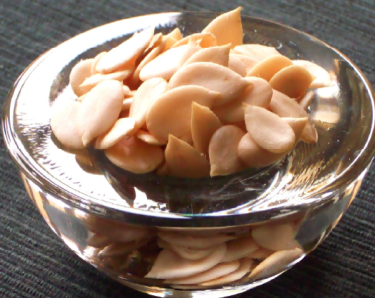 |
| Melon seeds |
Melon seeds refer to the oil rich, high protein, seeds of some of the edible gourd/pumpkin plants. These are dried and shelled to reveal flat, oval shaped, white seeds which are used to make one of Nigerians' most popular dishes.
Virtually every tribe in Nigeria has a dish made with this very versatile food ingredient. Locally called egusi, egunsi, egushi, agushi, sun dried and milled melon seeds are used as an additive, thickener to stews and soups. They can also be processed to extract melon seed oil (ororo egusi) and a by-product of this process, called robo; a street snack more popular among the Abeokuta people of Ogun state.
In combination with peppers, onions, leafy vegetables, meat and/or fish, melon seeds are most frequently used to make egusi a popular traditional soup served with pounded yam or gari, amala or boiled rice.
Health Benefits
There is a general misconception that melon seeds (egusi) contain cholesterol. To clarify this misconception, I would like to state that, like all foods of plant origin, melon seeds do not have cholesterol! They are instead very rich in good fats (polyunsaturates and monounsaturates). They also have a proportion of saturated fats which is the factor that raises the concern, but studies have proved otherwise. Melon seeds contain essential fatty acids believed to aid maintenance of a healthy heart, needed for hormone balance, brain function and skin health.
Nutritional Data (100g of milled uncooked shelled melon seeds)
Calories - 610kcal
Dietary fibre - 3g
Carbohydrates - 10g
Protein - 30g
Fats - 49g
Vitamins: E, Folic acid, Niacin
Minerals: Zinc, Copper, Selenium, Magnesium, Phosphorus
Cooking with Melon seeds
Largely, dried melon seeds are are milled into a "powdery paste" and used in stews and soups in combination with other ingredients/additives. Methods and ingredients used to cook egusi vary depending on the locality. For example the Yorubas' efo elegusi features more leafy vegetables than melon seeds, while the Igbo style has more egusi than leafy vegetables. Yet the Ijebus' cook theirs without leafy vegetables! Different types of leafy vegetables are added to egusi soup such as spinach, amaranth leaves, bitter leaf, water leaf, etc. However, all versions of egusi soup feature considerable amounts of meats, game and/or fish (especially stock-fish or dried fish), seafood (crayfish) and served with pounded yam, gari, amala or boiled rice.
Melon Recipes to try: